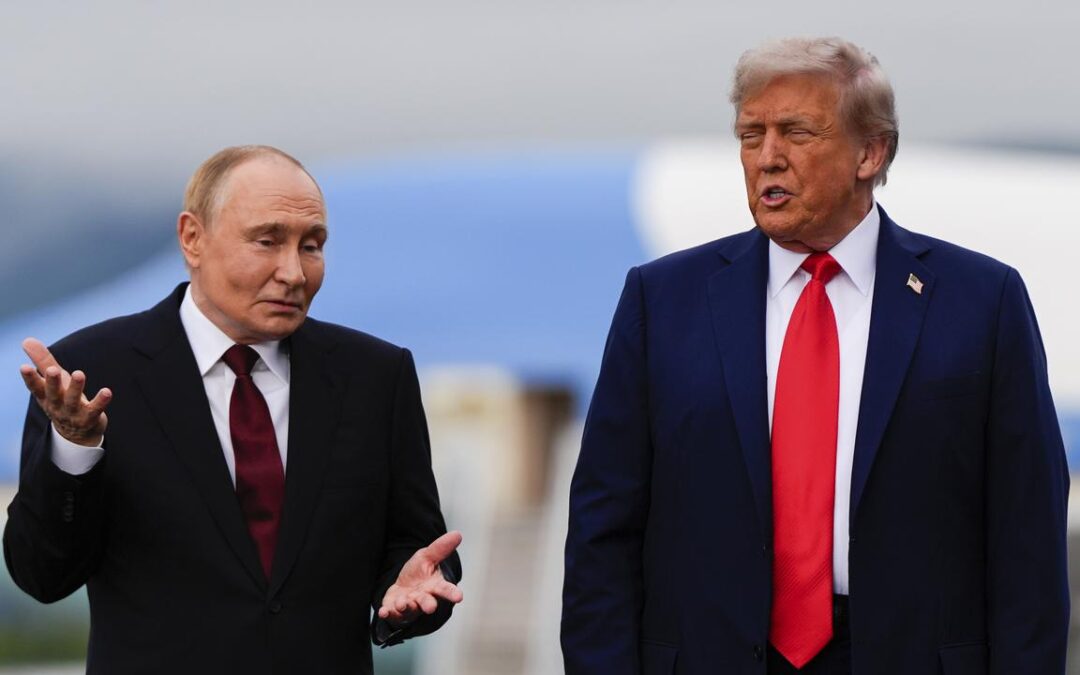
Trump-Putin talks on Ukraine end as summit stretches on
US President Donald Trump and Russian President Vladimir Putin have met face-to-face for almost three hours over Moscow’s war in Ukraine on Friday, as the two world leaders sought an end to the deadliest conflict in Europe in 80 years.
There was no immediate word on whether the talks had produced any progress toward a ceasefire in the war, a goal that Trump had set at the outset. The pair were set to jointly speak to reporters shortly.
Trump and Putin, along with top foreign-policy aides, conferred in a room at an Air Force base in Anchorage, Alaska in their first meeting since 2019. A blue backdrop behind them had the words “Pursuing Peace” printed on it.
Trump’s publicly stated aim for the talks was to secure a halt to the fighting and a commitment by Putin to meet swiftly with Ukrainian President Volodymyr Zelenskiy to negotiate an end to the war, which began when Russia invaded its neighbor in February 2022.
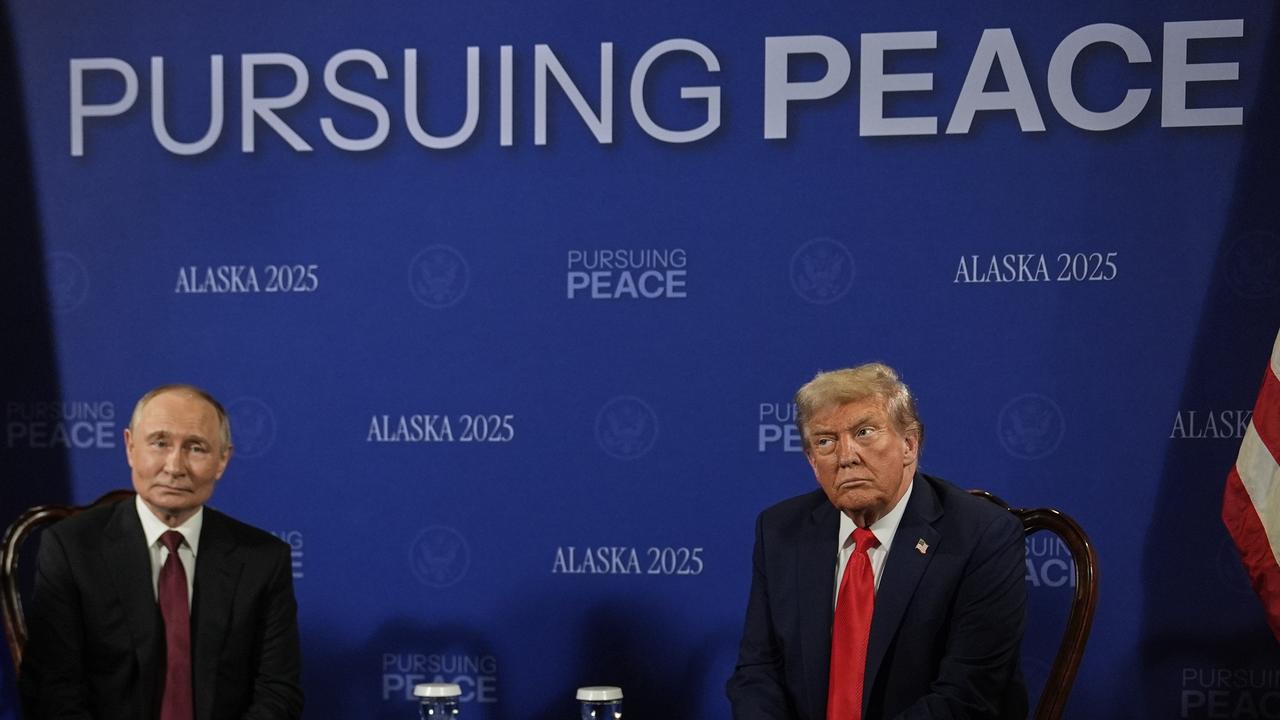
Earlier in the week, Trump said he would know if Putin was serious about peace within minutes of seeing him. He also threatened to walk out of the talks if they were unproductive.
Zelenskiy, who was not invited to the summit, and his European allies fear Trump might sell out Ukraine by essentially freezing the conflict with Russia and recognizing – if only informally – Russian control over one-fifth of Ukraine.
Trump sought to assuage such concerns as he boarded Air Force One, saying he would let Ukraine decide on any possible territorial swaps. “I’m not here to negotiate for Ukraine, I’m here to get them at a table,” he said.
Asked what would make the meeting a success, he told reporters: “I want to see a ceasefire rapidly … I’m not going to be happy if it’s not today … I want the killing to stop.”
Once on the ground in Alaska, Trump greeted Putin on a red carpet on the base’s tarmac. The two shook hands warmly and touched each other on the arm before riding in Trump’s limo to the summit site nearby.
The initial talks also included US Secretary of State Marco Rubio, Trump’s special envoy to Russia, Steve Witkoff, Russian foreign policy aide Yury Ushakov and Foreign Minister Sergei Lavrov.
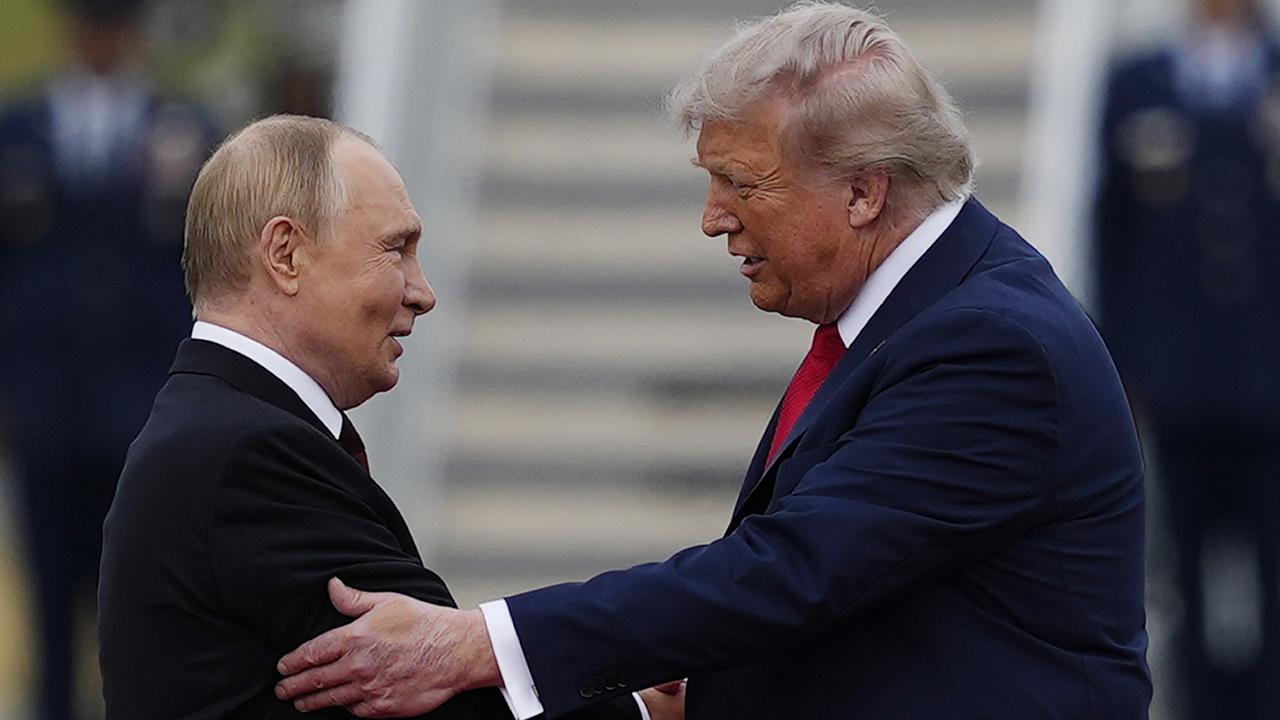
Trump hopes a truce in the war that Putin started will bring peace to the region as well as bolster his credentials as a global peacemaker worthy of the Nobel Peace Prize.
For Putin, the summit is already a big win that he can portray as evidence that years of Western attempts to isolate Russia have unravelled and that Moscow is retaking its rightful place at the top table of international diplomacy.
Putin is wanted by the International Criminal Court, accused of the war crime of deporting hundreds of children from Ukraine. Russia denies allegations of war crimes and the Kremlin has dismissed the ICC warrant as null and void. Russia and the United States are not members of the court.
Both Moscow and Kyiv deny targeting civilians in the war. But thousands of civilians have died in the conflict, the vast majority of them Ukrainian.
A conservative estimate of dead and injured in the war in Ukraine – from both sides combined – totals 1.2 million people, Trump’s envoy to Ukraine, Keith Kellogg, said in May.
Trump, who once said he would end Russia’s war in Ukraine within 24 hours, conceded on Thursday it had proven a tougher task than he had expected.
He said if Friday’s talks went well, quickly arranging a second, three-way summit with Zelenskiy would be more important than his encounter with Putin.
Zelenskiy said Friday’s summit should open the way for a “just peace” and three-way talks that included him, but added that Russia was continuing to wage war. A Russian ballistic missile earlier struck Ukraine’s Dnipropetrovsk region, killing one person and wounding another.
“It’s time to end the war, and the necessary steps must be taken by Russia. We are counting on America,” Zelenskiy wrote on the Telegram messaging app.
Zelenskiy has ruled out formally handing Moscow any territory and is also seeking a security guarantee backed by the United States.
Trump said before the summit that there is mutual respect between him and Putin.
“He is a smart guy, been doing it for a long time, but so have I … We get along,” Trump said of Putin. He also welcomed Putin’s decision to bring businesspeople to Alaska.
“But they’re not doing business until we get the war settled,” he said, repeating a threat of “economically severe” consequences for Russia if the summit goes badly.
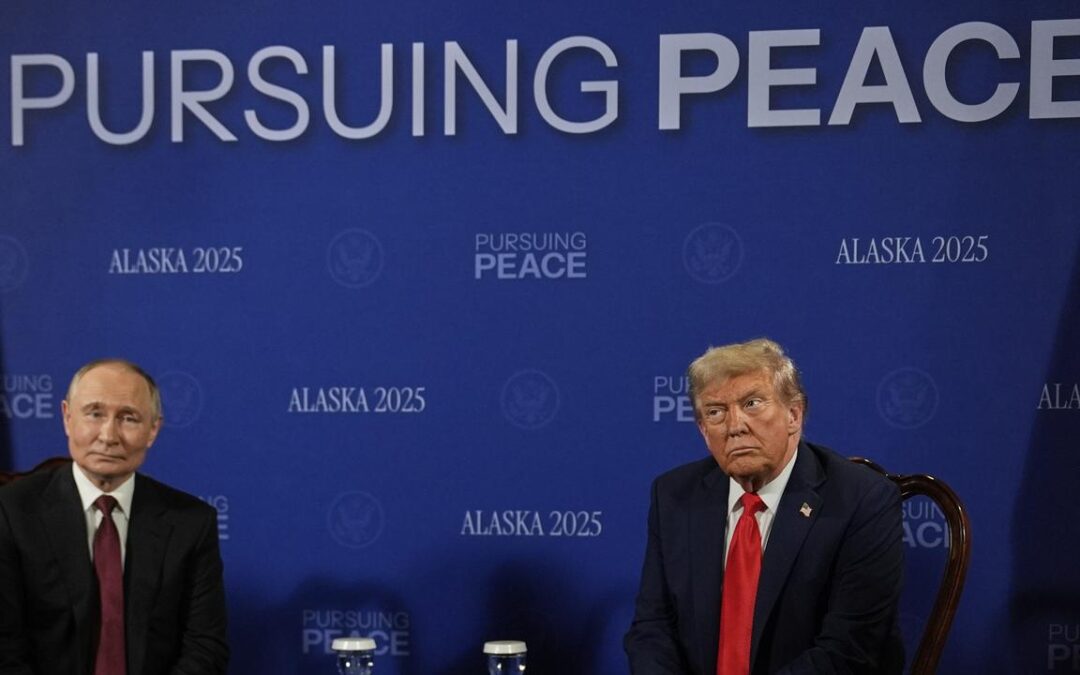
Putin, Trump sit down to discuss Ukraine’s fate
US President Donald Trump and Russian counterpart Vladimir Putin are meeting face-to-face in Alaska in high-stakes talks that could determine whether a ceasefire can be reached in the deadliest war in Europe since World War Two.
Ahead of the summit on Friday, Trump greeted the Russian leader on a red carpet on the tarmac at a US military base.
The two shook hands warmly and touched each other on the arm before riding in Trump’s limo to the summit site nearby.
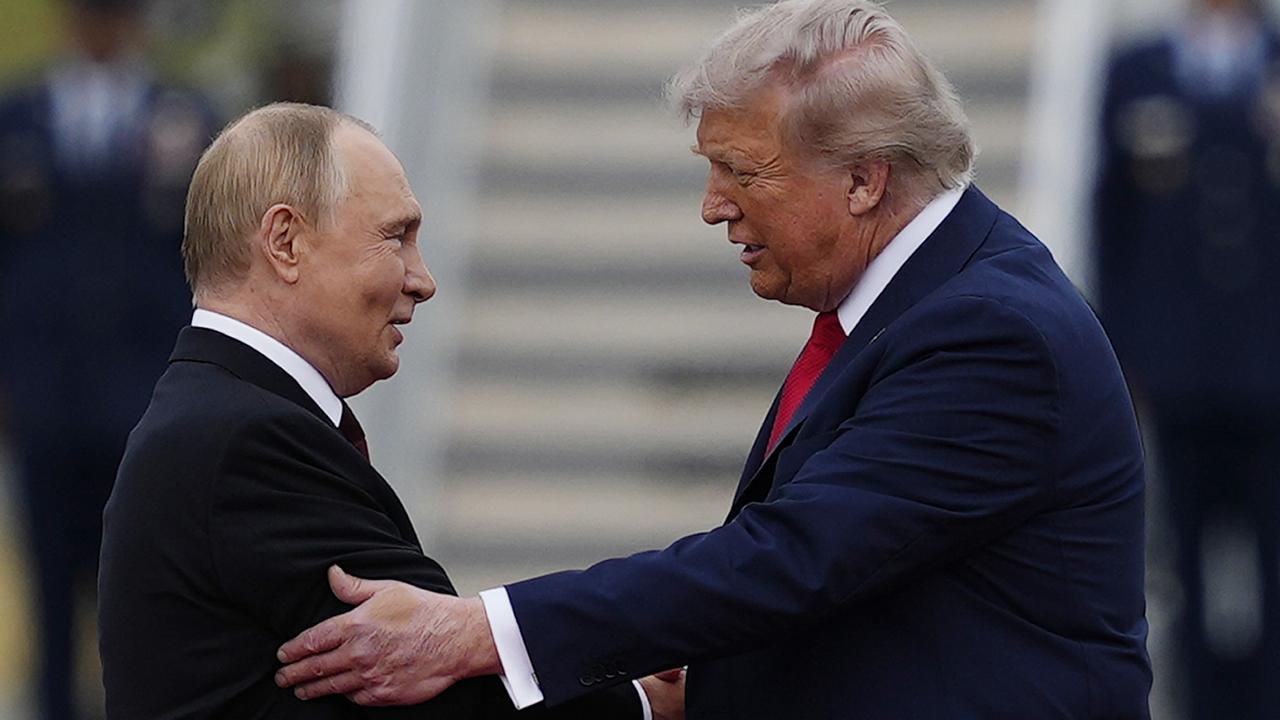
The two leaders sat silently with their respective delegations seated to the side in their first meeting since 2019.
They were seated in front of a blue backdrop that had the words, “Pursuing Peace” printed on it.
Ukrainian President Volodymyr Zelenskiy, who was not invited to the talks, and his European allies fear Trump might sell out Ukraine by essentially freezing the conflict and recognising, if only informally, Russian control over one-fifth of Ukraine.
Earlier, Trump sought to assuage such concerns, saying he would let Ukraine decide on any possible territorial swaps.
“I’m not here to negotiate for Ukraine, I’m here to get them at a table,” he said.
Asked what would make the meeting a success, he told reporters: “I want to see a ceasefire rapidly… I’m not going to be happy if it’s not today… I want the killing to stop.”
Trump will be joined in his meeting with Putin by Secretary of State Marco Rubio and Trump’s special envoy to Russia, Steve Witkoff, White House spokeswoman Karoline Leavitt said.
The Russian officials accompanying Putin in the talks with the US delegation will be foreign policy aide Yury Ushakov and Foreign Minister Sergei Lavrov.
Both the US and Russian presidents are seeking wins from their first face-to-face talks since Trump returned to the White House.
Trump, who casts the war as a “bloodbath”, is pressing for a truce in the 3.5-year-old war that would bolster his credentials as a global peacemaker worthy of the Nobel Peace Prize.
For Putin, the summit is already a big win as he can use it to say that years of Western attempts to isolate Russia have unravelled and that Moscow has retaken its rightful place at the top table of international diplomacy.
Russian special envoy Kirill Dmitriev described the pre-summit mood as “combative” and said the two leaders would discuss not only Ukraine but the full spectrum of bilateral relations, Russia’s RIA news agency reported.
Trump, who once said he would end Russia’s war in Ukraine within 24 hours, conceded on Thursday it had proven a tougher nut to crack than he thought.
Trump said that if talks went well, quickly arranging a second three-way summit with Zelenskiy would be even more important than his encounter with Putin.
Zelenskiy said Russia was continuing to attack Ukraine ahead of a summit.
“On the day of the negotiations, they also kill people. And that says a lot,” Zelenskiy said on the Telegram messaging app.
Earlier, Ukrainian regional officials said Russia had launched a ballistic missile into Dnipropetrovsk region in eastern Ukraine, killing one person and wounding at least one other.
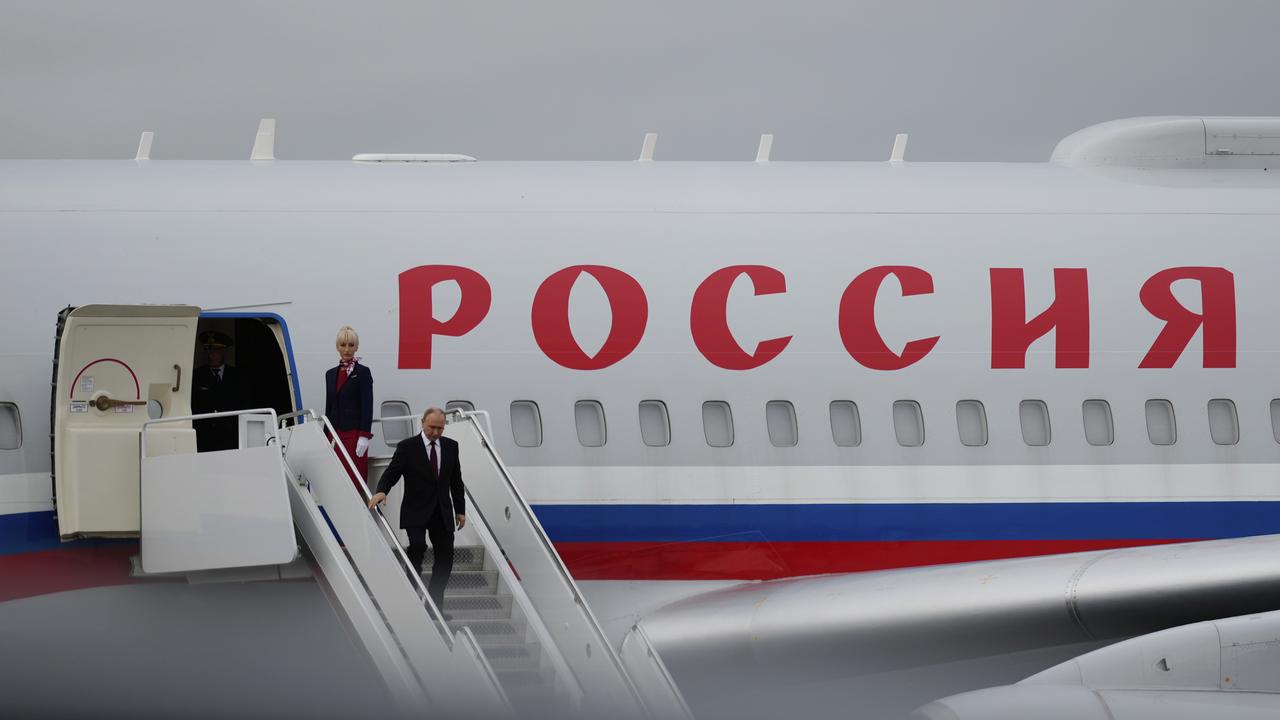
(AP PHOTO)
One source acquainted with Kremlin thinking said there were signs Moscow could be ready to strike a compromise on Ukraine, given that Putin understood Russia’s economic vulnerability and costs of continuing the war.
Putin has said he is open to a full ceasefire but that issues of verification must first be sorted out.
One compromise could be a truce in the air war.
Ukrainians who spoke to Reuters in central Kyiv on Friday were not optimistic about the Alaska summit.
“Nothing good will happen there, because war is war, it will not end. The territories – we’re not going to give anything to anyone,” said Tetiana Harkavenko, a 65-year-old cleaner.
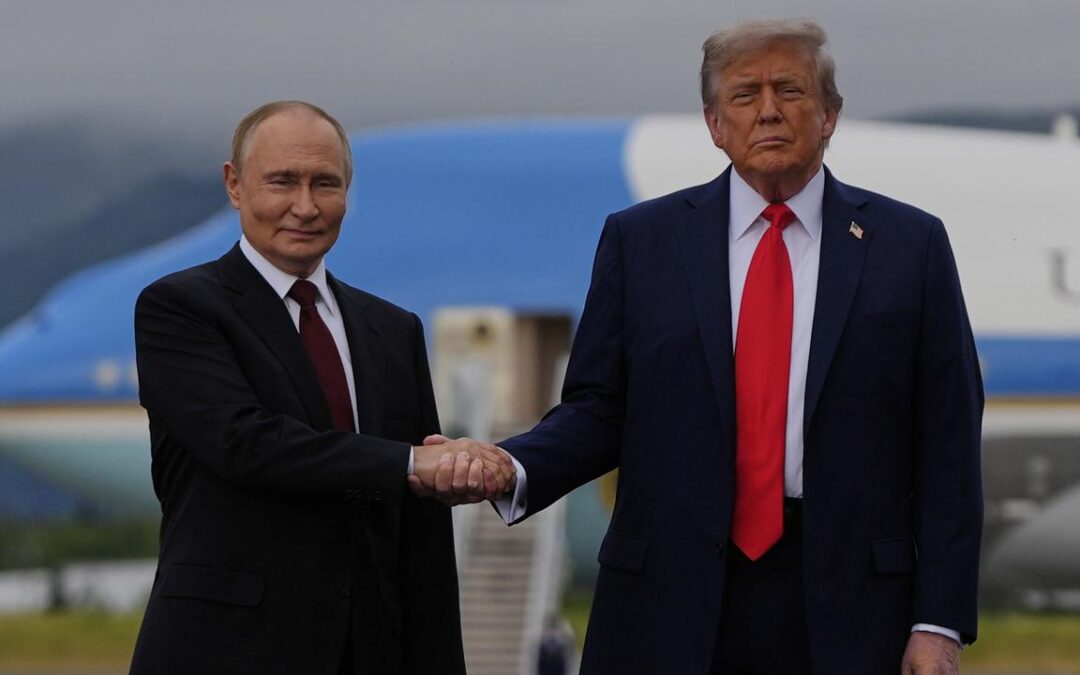
Putin and Trump shake hands ahead of Alaska summit
US President Donald Trump has greeted Russian President Vladimir Putin with a handshake ahead of a high-stakes summit in Alaska that could determine whether a ceasefire can be reached in the deadliest war in Europe since the Second World War.
Trump disembarked his plane, Air Force One, and awaited Putin on the tarmac. The two exchanged greetings while smiling.
US F-22 aircraft were placed on either side of the red carpet.
Nearly half a million people watched Putin’s plane land on Flightradar24.
The meeting is now underway.
Ukrainian President Volodymyr Zelenskiy, who was not invited to the talks, and his European allies fear Trump might sell out Ukraine by essentially freezing the conflict and recognising, if only informally, Russian control over one-fifth of Ukraine.
Earlier, Trump sought to assuage such concerns, saying he would let Ukraine decide on any possible territorial swaps.
“I’m not here to negotiate for Ukraine, I’m here to get them at a table,” he said.
Asked what would make the meeting a success, he told reporters: “I want to see a ceasefire rapidly… I’m not going to be happy if it’s not today… I want the killing to stop.”
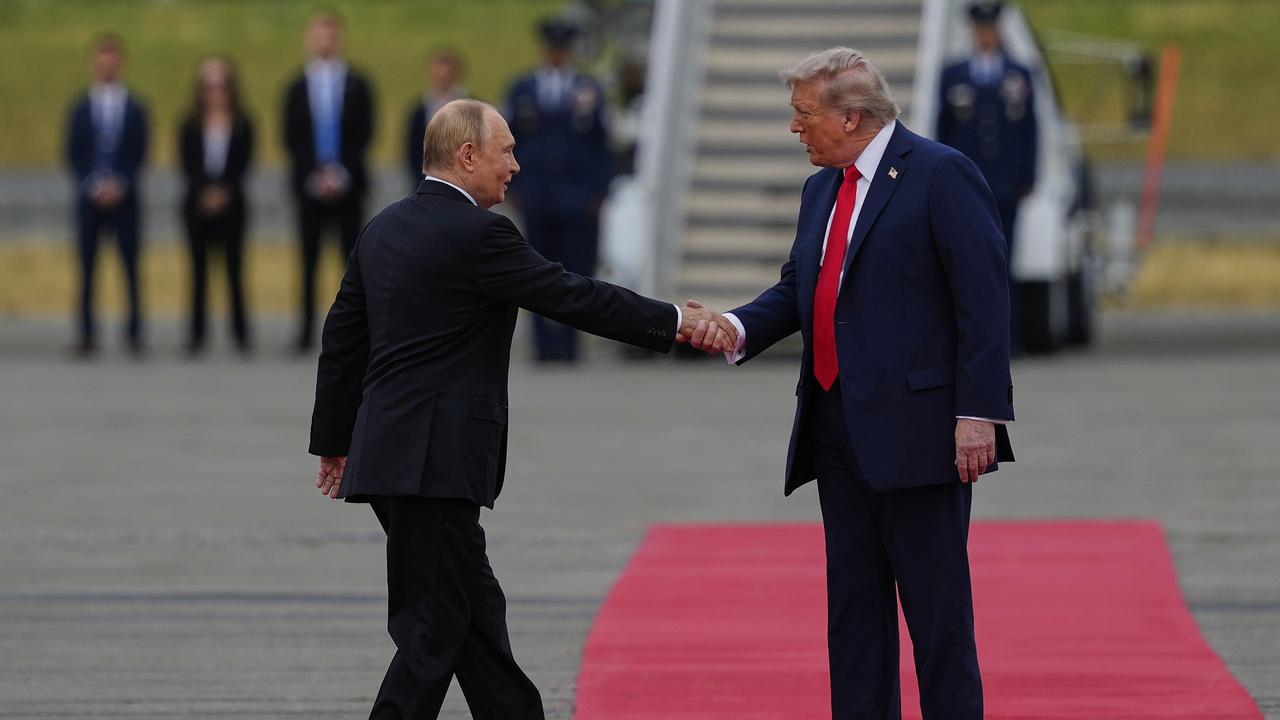
Both the US and Russian presidents, due to meet at a Cold War-era air force base in Alaska’s largest city, are seeking wins from their first face-to-face talks since Trump returned to the White House.
Trump will be joined in his meeting with Putin by Secretary of State Marco Rubio and Trump’s special envoy to Russia, Steve Witkoff, White House spokeswoman Karoline Leavitt said.
Putin is also expected to have senior aides at his side.
Trump, who casts the war as a “bloodbath”, is pressing for a truce in the 3.5-year-old war that would bolster his credentials as a global peacemaker worthy of the Nobel Peace Prize.
For Putin, the summit is already a big win as he can use it to say that years of Western attempts to isolate Russia have unravelled and that Moscow has retaken its rightful place at the top table of international diplomacy.
Russian special envoy Kirill Dmitriev described the pre-summit mood as “combative” and said the two leaders would discuss not only Ukraine but the full spectrum of bilateral relations, Russia’s RIA news agency reported.
Trump, who once said he would end Russia’s war in Ukraine within 24 hours, conceded on Thursday it had proven a tougher nut to crack than he thought.
He said that if talks went well, quickly arranging a second three-way summit with Zelenskiy would be even more important than his encounter with Putin.
Zelenskiy said Russia was continuing to attack Ukraine ahead of a summit.
“On the day of the negotiations, they also kill people. And that says a lot,” Zelenskiy said on the Telegram messaging app.
Earlier, Ukrainian regional officials said Russia had launched a ballistic missile into Dnipropetrovsk region in eastern Ukraine, killing one person and wounding at least one other.
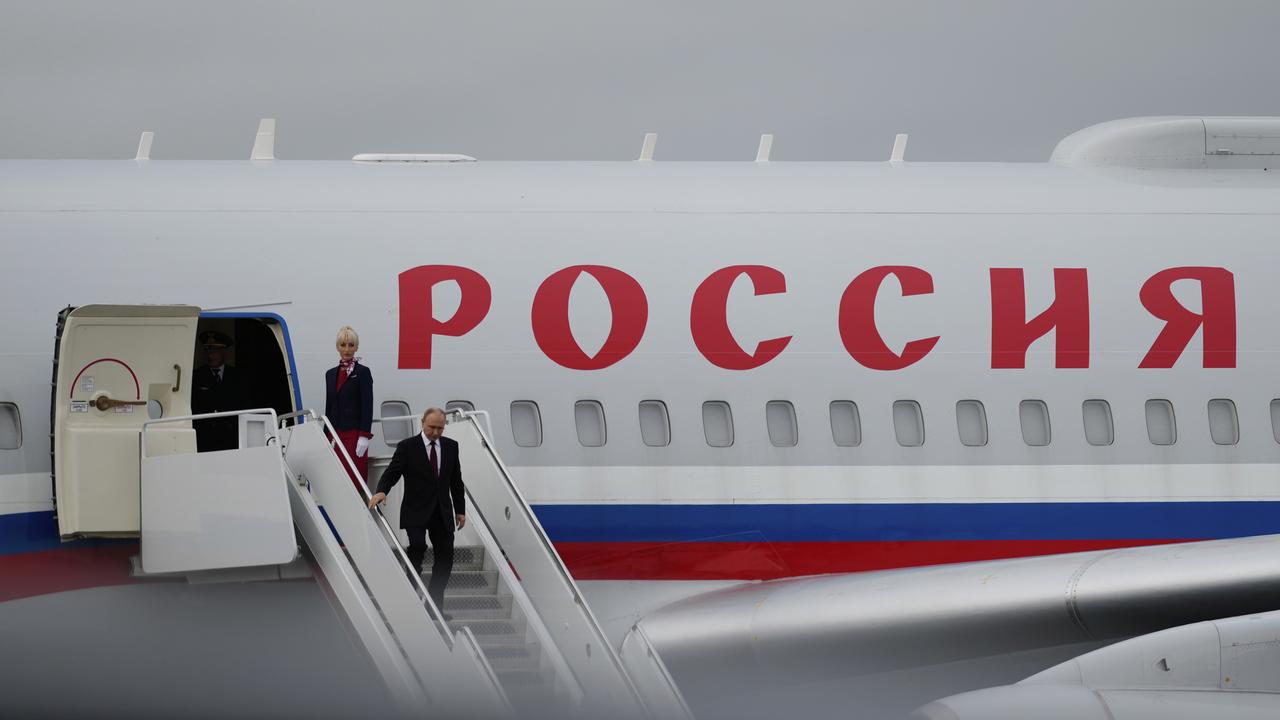
(AP PHOTO)
One source acquainted with Kremlin thinking said there were signs Moscow could be ready to strike a compromise on Ukraine, given that Putin understood Russia’s economic vulnerability and costs of continuing the war.
Russia, whose war economy is showing signs of strain, is vulnerable to further US sanctions.
Ukrainians who spoke to Reuters in central Kyiv on Friday were not optimistic about the Alaska summit.
“Nothing good will happen there, because war is war, it will not end. The territories – we’re not going to give anything to anyone,” said Tetiana Harkavenko, a 65-year-old cleaner.
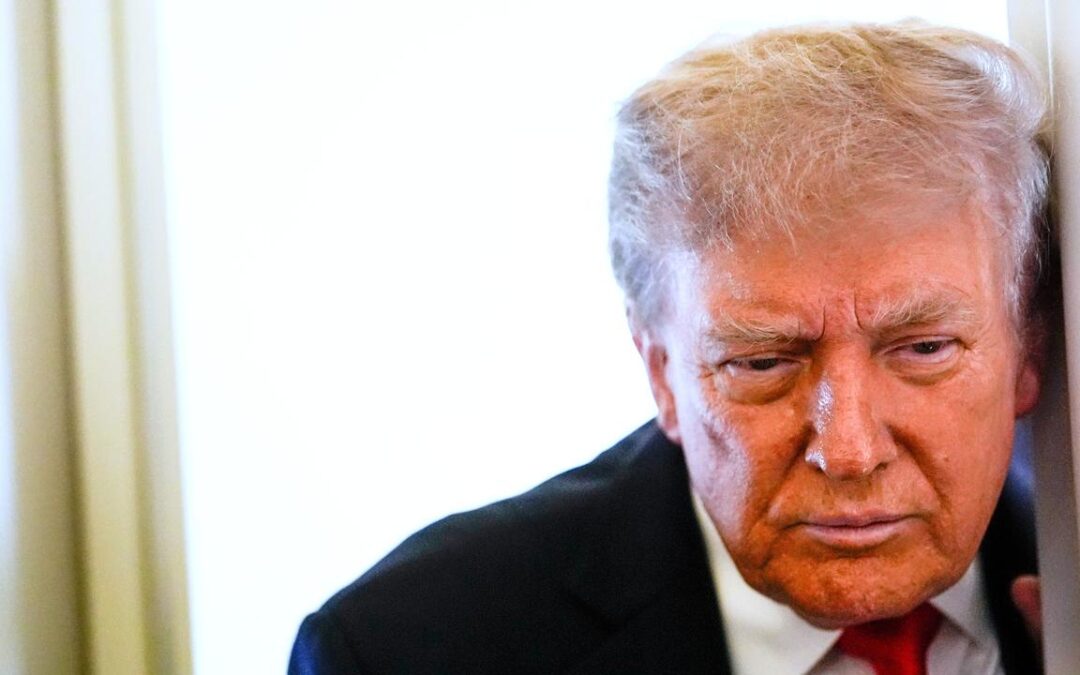
Putin lands for high-stakes summit with Trump
Russian President Vladimir Putin has arrived in Alaska to greet a waiting US President Donald Trump ahead of a summit that could determine whether a ceasefire can be reached in the deadliest war in Europe since World War Two.
The Kremlin says the Putin-Trump talks could last at least six to seven hours.
Nearly half a million people watched Putin’s plane land on Flightradar24.
Ukrainian President Volodymyr Zelenskiy, who was not invited to the talks, and his European allies fear Trump might sell out Ukraine by essentially freezing the conflict and recognising, if only informally, Russian control over one-fifth of Ukraine.
Earlier, Trump sought to assuage such concerns as he boarded Air Force One, saying he would let Ukraine decide on any possible territorial swaps.
“I’m not here to negotiate for Ukraine, I’m here to get them at a table,” he said.
Asked what would make the meeting a success, he told reporters: “I want to see a ceasefire rapidly… I’m not going to be happy if it’s not today… I want the killing to stop.”
Both the US and Russian presidents, due to meet at a Cold War-era air force base in Alaska’s largest city, are seeking wins from their first face-to-face talks since Trump returned to the White House.
Trump will be joined in his meeting with Putin by Secretary of State Marco Rubio and Trump’s special envoy to Russia, Steve Witkoff, White House spokeswoman Karoline Leavitt said.
Putin is also expected to have senior aides at his side.
Trump, who casts the war as a “bloodbath”, is pressing for a truce in the 3.5-year-old war that would bolster his credentials as a global peacemaker worthy of the Nobel Peace Prize.
For Putin, the summit is already a big win as he can use it to say that years of Western attempts to isolate Russia have unravelled and that Moscow has retaken its rightful place at the top table of international diplomacy.
Russian special envoy Kirill Dmitriev described the pre-summit mood as “combative” and said the two leaders would discuss not only Ukraine but the full spectrum of bilateral relations, Russia’s RIA news agency reported.
In a symbolic gesture en route for Alaska, Putin laid flowers on Friday at a memorial in Russia’s Far East commemorating US-Soviet cooperation in World War Two.
The Kremlin said Putin would arrive in Alaska at 11am (5am Saturday AEST) and that Trump would meet the Russian leader at his plane.
Trump, who once said he would end Russia’s war in Ukraine within 24 hours, conceded on Thursday it had proven a tougher nut to crack than he thought.
He said that if talks went well, quickly arranging a second three-way summit with Zelenskiy would be even more important than his encounter with Putin.
Zelenskiy said Russia was continuing to attack Ukraine ahead of a summit.
“On the day of the negotiations, they also kill people. And that says a lot,” Zelenskiy said on the Telegram messaging app.
Earlier, Ukrainian regional officials said Russia had launched a ballistic missile into Dnipropetrovsk region in eastern Ukraine, killing one person and wounding at least one other.
One source acquainted with Kremlin thinking said there were signs Moscow could be ready to strike a compromise on Ukraine, given that Putin understood Russia’s economic vulnerability and costs of continuing the war.
Russia, whose war economy is showing signs of strain, is vulnerable to further US sanctions.

Ukrainians who spoke to Reuters in central Kyiv on Friday were not optimistic about the Alaska summit.
“Nothing good will happen there, because war is war, it will not end. The territories – we’re not going to give anything to anyone,” said Tetiana Harkavenko, a 65-year-old cleaner.
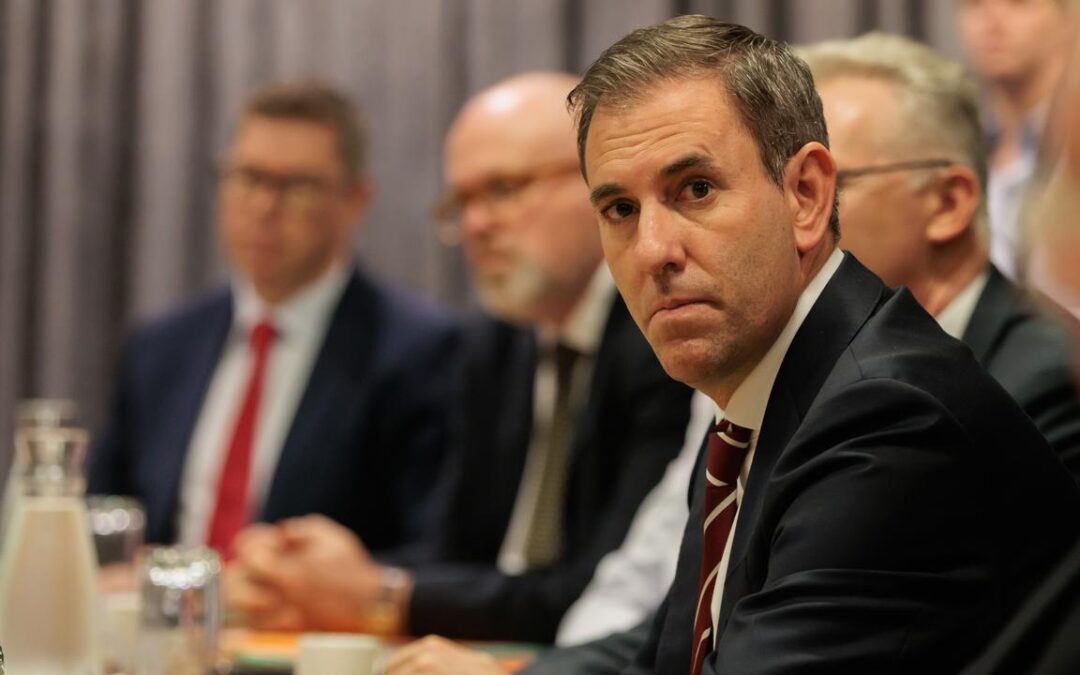
Responsibility, not legacy driving Chalmers to reform
If those who can’t remember history are condemned to repeat it, Jim Chalmers has as good a chance as any at avoiding the pitfalls of reformist treasurers past.
Dr Chalmers is attempting the most ambitious process of economic reform by a Labor treasurer since Paul Keating’s 1985 tax summit or Wayne Swan’s tax forum of 2011.
While Mr Keating’s summit led to significant reform around income taxes, it buried his centrepiece policy – a broad-based consumption tax like the GST – for another 15 years.
Mr Swan’s attempt amounted to even less.
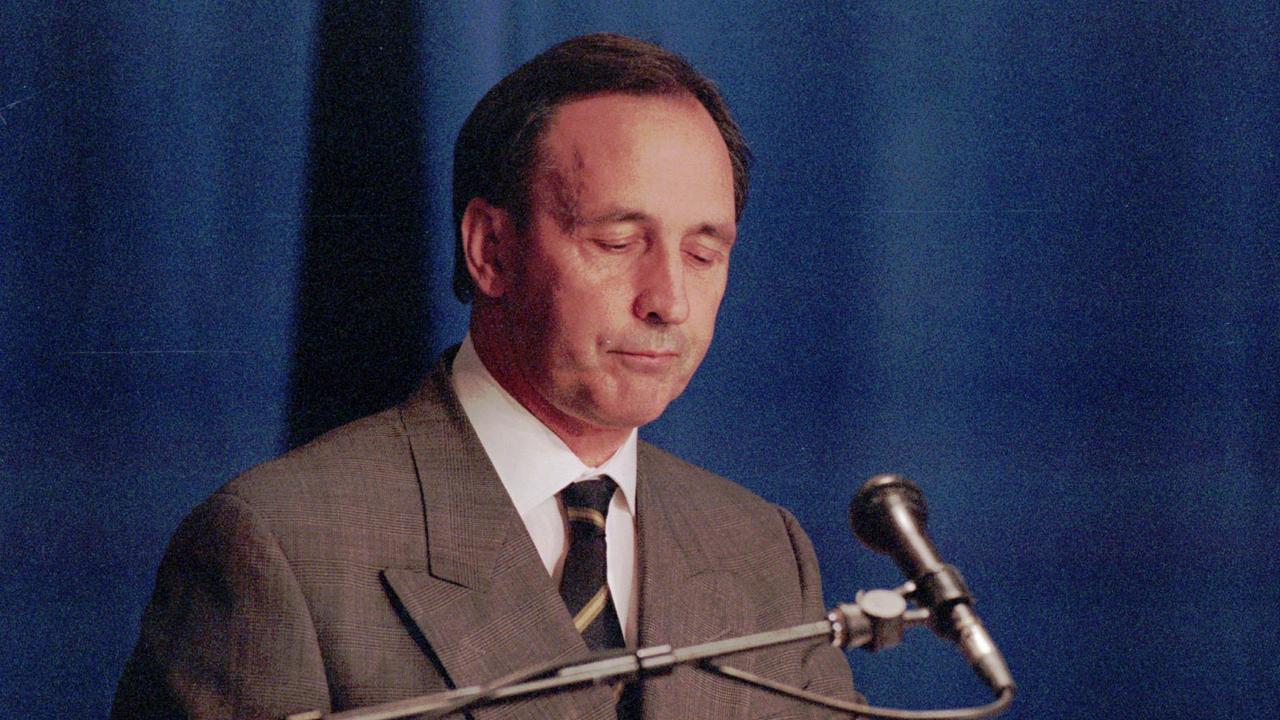
History will drive Dr Chalmers as he prepares for his own economic reform roundtable – running from Tuesday to Thursday in Canberra – speculates veteran economist Saul Eslake.
“As a biographer of Keating and a former staffer for Swan, he knows the difference between treasurers who are remembered as great treasurers and treasurers who aren’t, and he’d like to be in the former group, I suspect,” Mr Eslake says.
Dr Chalmers says he doesn’t see it in personal terms.
Australia’s economy has made a lot of positive strides in recent years, he says.
Economic developments last week backed that up, with unemployment falling, real wages growing at a five-year high and a third interest rate cut in six months.
But global volatility required more economic resilience, the nation’s dismal productivity performance was holding back living standards and a growing budget deficit threatened Australia’s future prosperity.
He sees the roundtable as an opportunity to reform the country in ways that make Australians better off.
“I do feel that all of us have a responsibility to use these positions of influence to strengthen the economy and, really, we can’t afford as a country to waste the next decade like our predecessors wasted the last one,” Dr Chalmers tells AAP.
“So I feel that responsibility but don’t see it in personal terms necessarily.”
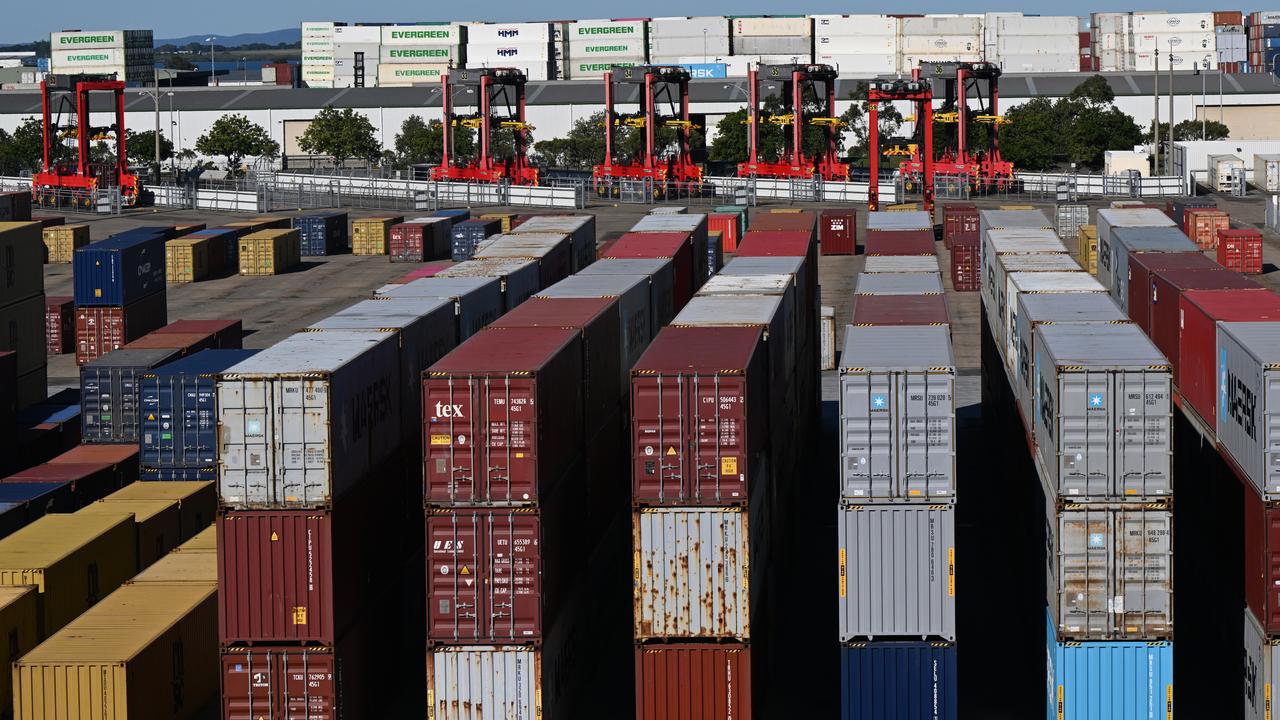
Already, the consultation has been worth it.
“We’ve shaken the tree for a whole bunch of ideas,” he says.
“We’ve focused the country’s attention on our big economic challenges, primarily productivity, and we’ve helped people understand the kinds of trade-offs and challenges the government is grappling with.”
Dr Chalmers says he’s optimistic he’ll find common ground in moves to remove unnecessary regulation holding back productivity, housing supply and the clean energy transition.
One example is the financial regulator ASIC’s announcement on Wednesday that it will review a regulation called RG 97, which forces super funds to disclose stamp duty when reporting fees involved in housing investments.
After feedback from investors at a roundtable in the lead-up to Dr Chalmers’ summit, ASIC heard removing the requirement could boost housing investment by $8.7 billion and get an additional 35,000 homes built by institutional investors over the next five years.
That’s the low-hanging fruit.
But there are signs the treasurer has been forced to lower his sights for more electorally difficult, large-scale tax reform.
Dr Chalmers insists he and Prime Minister Anthony Albanese are singing from the same hymn sheet.
But Mr Eslake believes the treasurer’s ambition has been reeled in by his boss, “the staunchest defender of the status quo of any prime minister I can remember”.
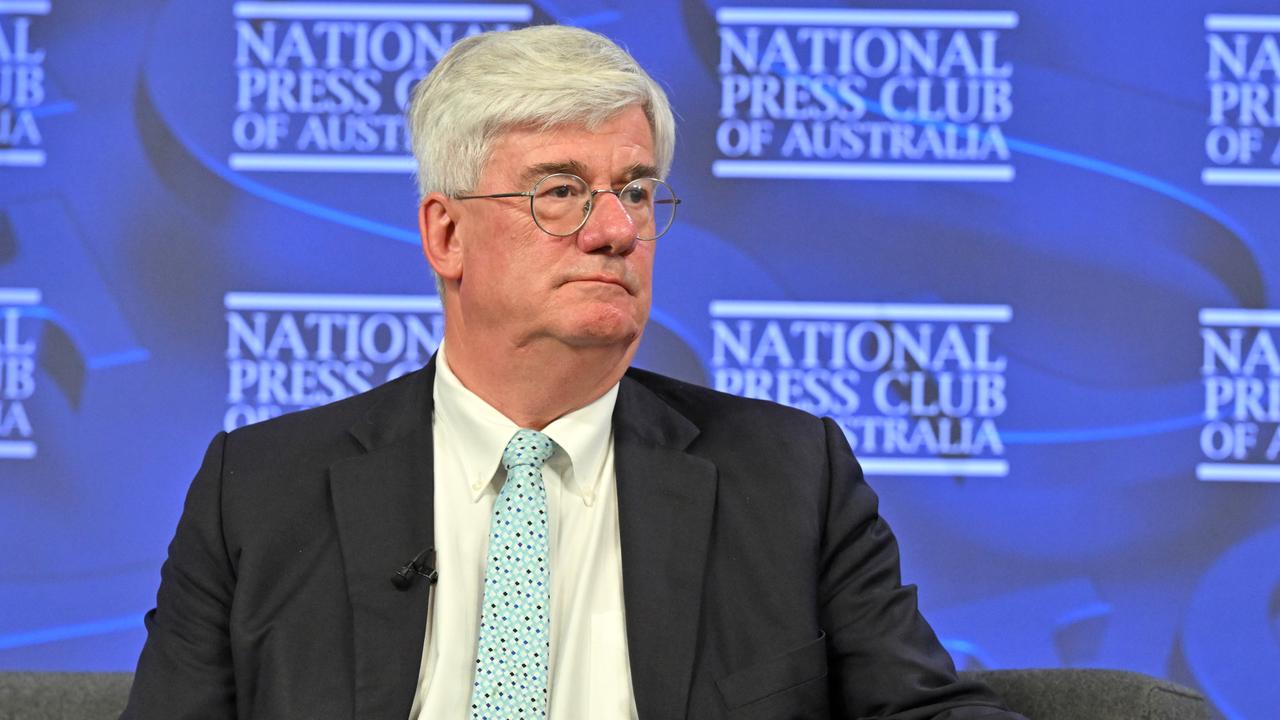
“Those aspirations appear to have been shot down, as it were, by his much more cautious prime minister, who has made it clear, particularly in the tax space, they’re not going to do anything they hadn’t said they would do during the election campaign,” he says.
History shows governments can’t push through major, contentious tax reform without receiving a mandate from the electorate.
But Mr Albanese found himself with a slim majority in his first term, so felt he could only seek a light mandate at his second election, limiting his government to a minor agenda on tax.
One of those policies, reducing the tax concession for holders of large superannuation accounts, has copped flak because it would tax capital gains on assets before they are sold and the increased value is realised.
Mr Eslake would love to see the government use the roundtable as an opportunity to revisit the tax.
“While I support the objective, that people with big super balances should pay more tax, I absolutely support that, I don’t like the idea of taxing unrealised gains,” he says.
“Sometimes voters will give a government credit for saying, ‘yes, I know we had this idea but we’ve listened to the people and we’ve realised it’s not a good idea’.”
Dr Chalmers says he will listen to concerns about the policy but his intention is to proceed with the legislation regardless.
“I try and have a genuinely consultative approach,” he says.
“But we announced that policy more than two and a half years ago, we’re yet to hear an idea about a better way to go about it. I expect people will raise it at the roundtable and that’s fine.”
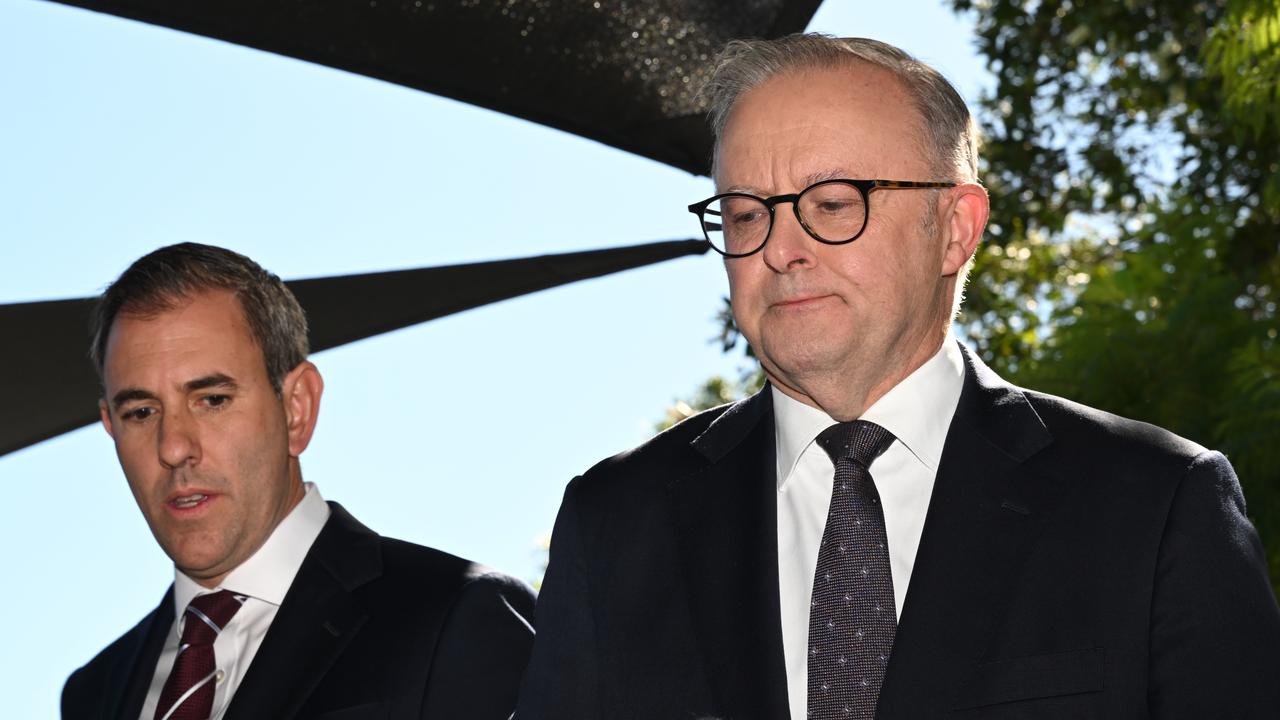
While he stresses he doesn’t want to pre-empt things by ruling any ideas in or out in advance, he acknowledges some policies, like raising or broadening the GST, will less likely receive his support.
“The policy changes we are most likely to pick up and run with are the ones consistent with the government’s values and directions,” Dr Chalmers says.
The government has consulted far and wide for reform ideas in the lead-up to the roundtable.
Nearly 900 submissions have been received, ministers have held more than 40 roundtables of their own and regulators have pitched 280 new ways to reduce the burden of red tape.
Dr Chalmers hopes he can find consensus to avoid the failures of past talkfests and has extended an invitation to shadow treasurer Ted O’Brien “in good faith”.
But he fears the coalition will be intentionally obstructionist, to make the roundtable appear a failure and inflict political damage on the government.
“My preference would be that they’re constructive about that opportunity,” he says.
“Unfortunately, they’re showing no signs of that yet. I think it will go down badly in the room if they just try and turn it into some kind of political stunt.”
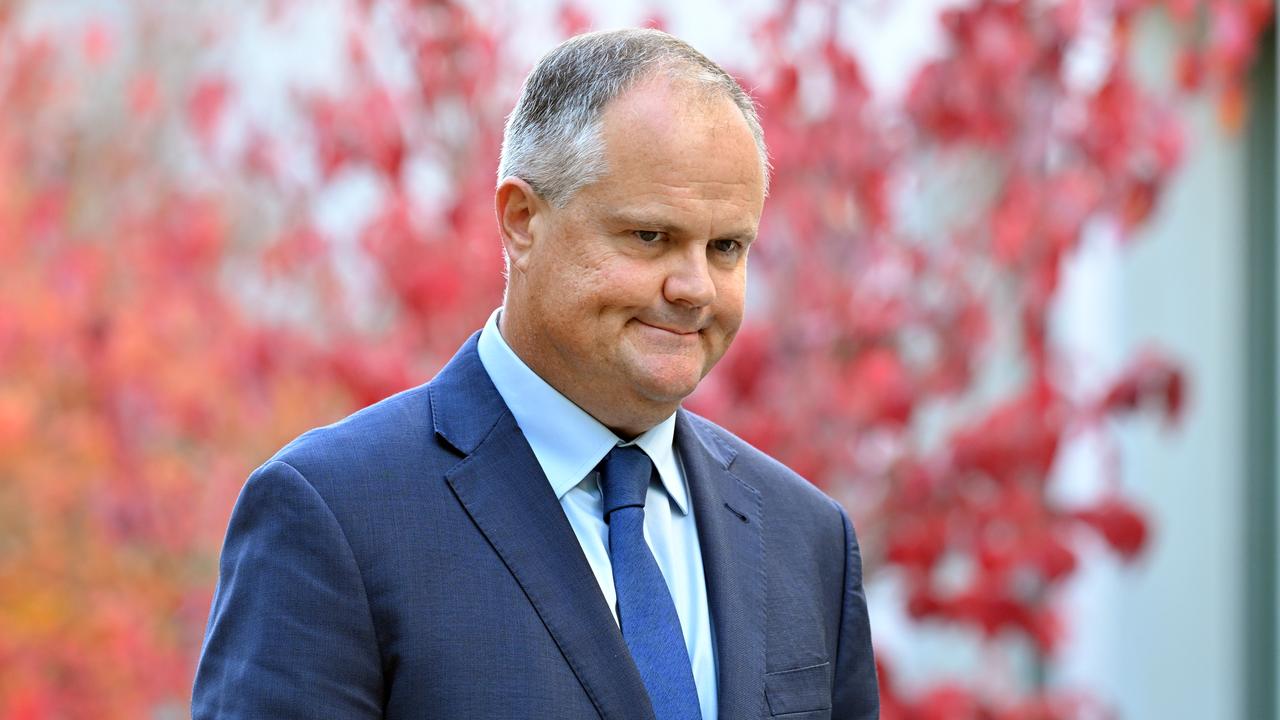
Opposition Leader Sussan Ley has accused Labor of choreographing the entire exercise to push through pre-determined policies, following a leaked Treasury document briefing Dr Chalmers on potential outcomes of the summit.
“It just tells me this whole thing is a stitch-up,” she told reporters on Thursday.
“They’re lining up an exercise at this productivity roundtable that is all about raising taxes.
“We’ll call it out when we see it.”
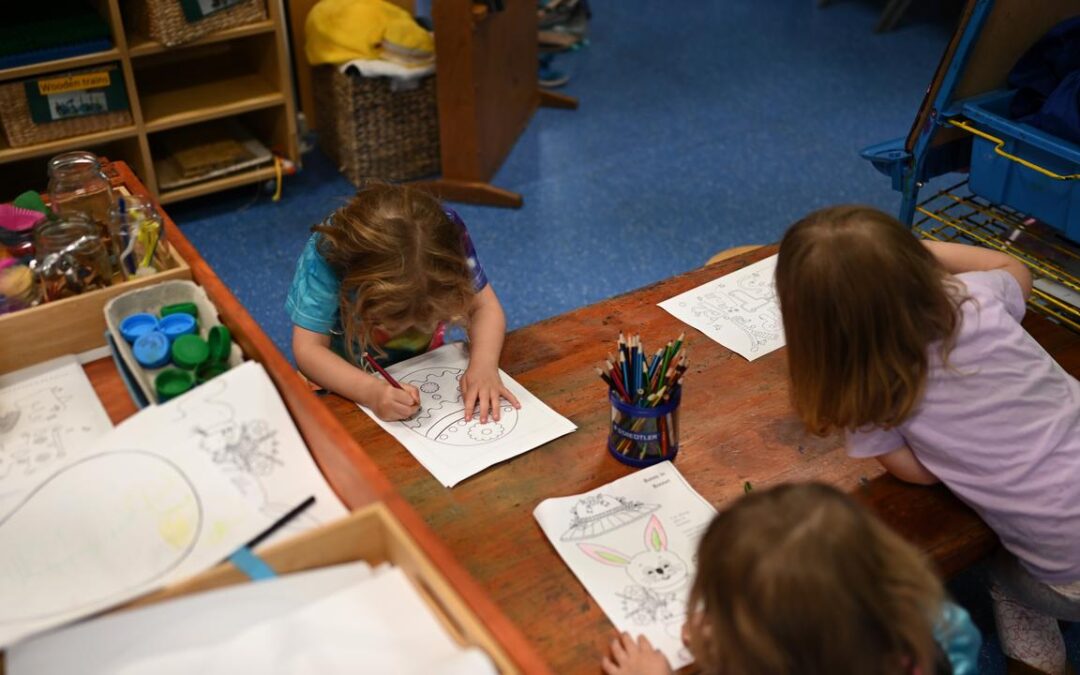
Parents cautiously welcome changes to childcare checks
Parents and unions have cautiously welcomed an overhaul of working-with-children checks but say more reforms are needed to keep kids safe.
Fast-tracked reforms unveiled on Friday will ensure that by the end of the year, anyone prevented from holding a working-with-children check in one state or territory will be automatically banned across the country.
Attorney-General Michelle Rowland described the change as “long overdue” but confirmed a national working-with-children check was not on the cards, with jurisdictions to continue managing their systems.
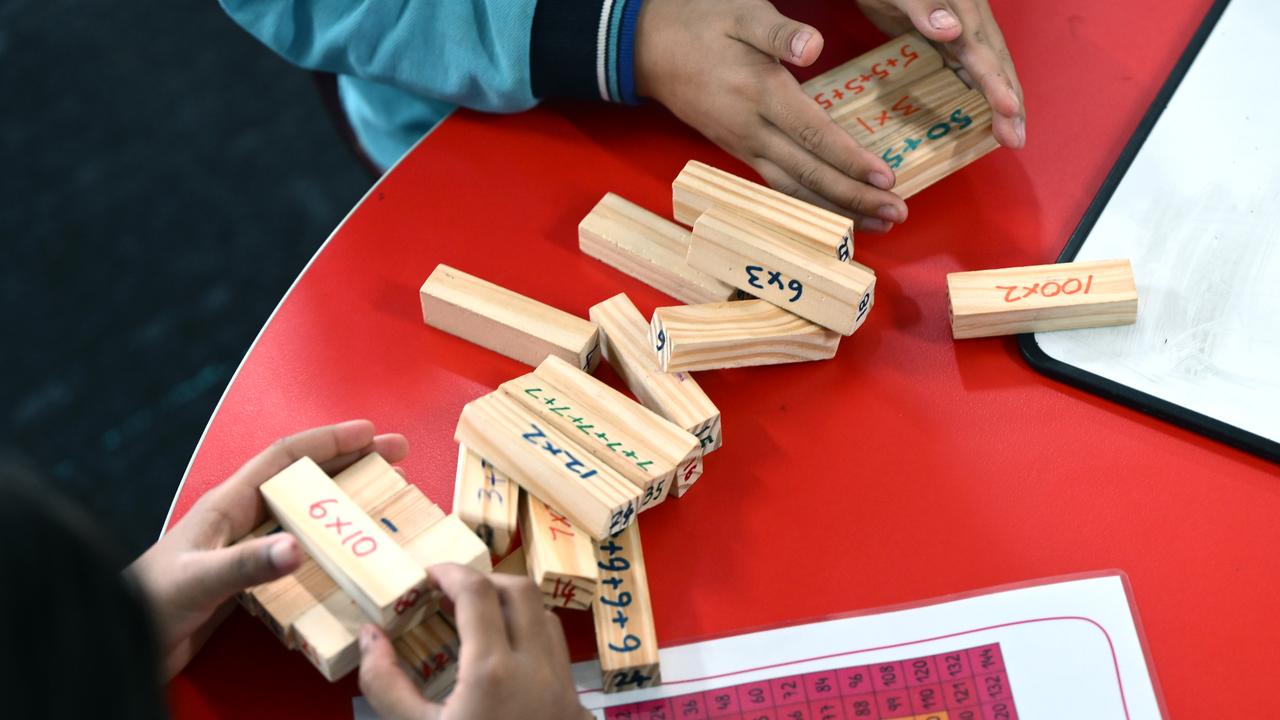
Australia’s peak early learning body said aligning the working-with-children checks nationwide would help protect children in care.
“This is an important first step (to) closing the loopholes that currently exist,” Australian Childcare Alliance president Paul Mondo said.
“This step alone, however, requires further commitments including the development of a national register for early childhood educators and teachers.”
National Children’s Commissioner Anne Hollonds described the changes as a huge relief, saying they would “absolutely make a difference to the safety of children”.
“This is just the first step of a whole range of actions that need to be taken,” she told ABC TV on Friday.
The changes come almost a month after Melbourne worker Joshua Dale Brown was charged with dozens of sex offences, including allegedly sexually abusing eight children.
Brown is known to have worked at 24 facilities between 2017 and the time of his arrest.
Melody Glaister’s daughter was one of 1200 children who had to be tested for sexually transmitted infections in July after attending a childcare centre where Brown had worked.
She was shocked to discover mutual recognition of decisions on working-with-children checks was not already in place.
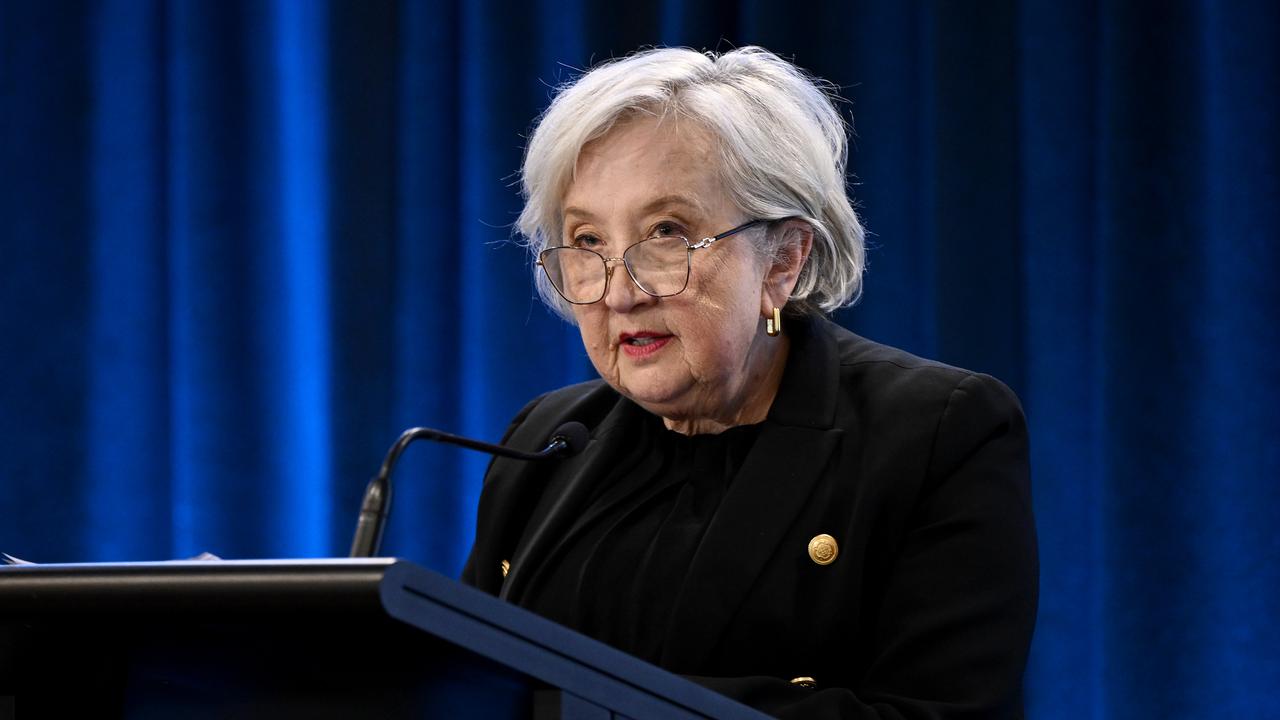
“It doesn’t make any sense,” Ms Glaister told AAP.
“The childcare sector is a mess and it does need reform and massive changes.
“We can’t trust that the system is safe for our children.”
Education Minister Jason Clare on Friday announced compliance action had been initiated against 30 early childhood centres under laws passed by the federal parliament in July.
Under the changes, funding will be stripped from centres not meeting safety standards.
The nation’s education ministers will meet next week to consider further child safety laws.
Jen Fleming, co-founder of advocacy group For Parents, said parents needed a seat at the reform table.
“Parents walk into childcare centres every day in this country and they leave their most precious people with childcare workers,” Ms Fleming told AAP.
“We as parents are quite rightly questioning what is going wrong in the system … they haven’t consulted with parents.”
1800 RESPECT (1800 737 732)
National Sexual Abuse and Redress Support Service 1800 211 028
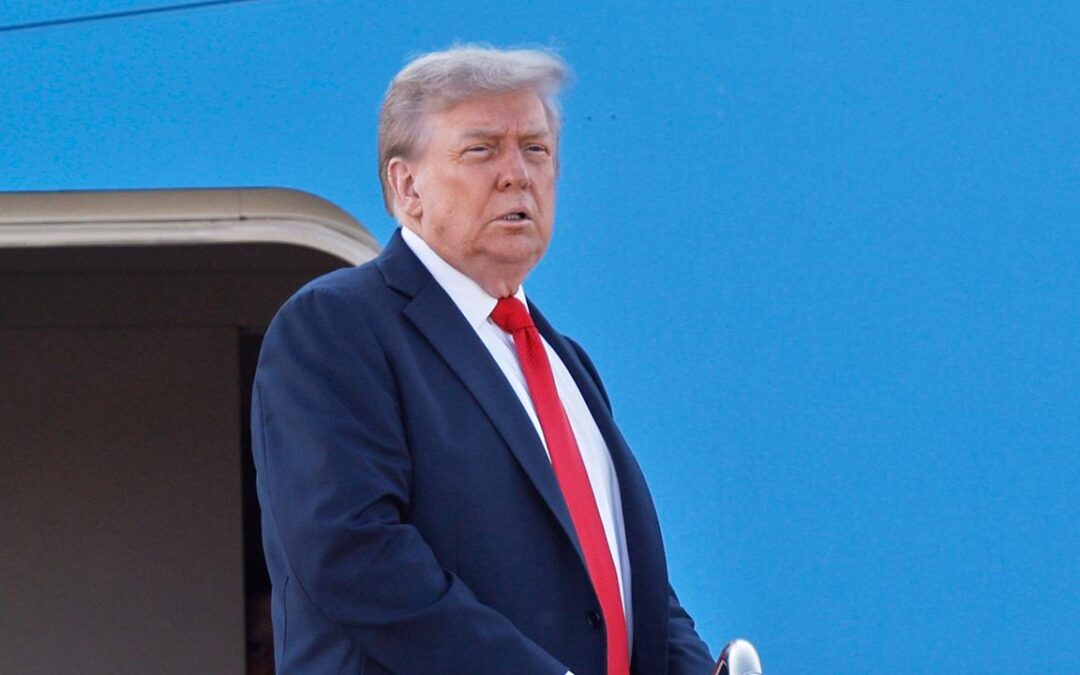
Trump heads to high-stakes Alaska summit with Putin
Donald Trump is headed to Alaska for what he called a “high-stakes” summit with Russia’s Vladimir Putin to discuss a ceasefire deal for Ukraine to help end the deadliest war in Europe since World War Two.
The Kremlin says the Putin-Trump talks could last at least six to seven hours.
Ukrainian President Volodymyr Zelenskiy, who was not invited to the talks, and his European allies fear Trump might sell out Ukraine by essentially freezing the conflict and recognising, if only informally, Russian control over one fifth of Ukraine.
Trump sought to assuage such concerns as he boarded Air Force One, saying he would let Ukraine decide on any possible territorial swaps.
“I’m not here to negotiate for Ukraine, I’m here to get them at a table,” he said.
Both the US and Russian presidents, due to meet at a Cold War-era air force base in Alaska’s largest city, are seeking wins from their first face-to-face talks since Trump returned to the White House.
Trump, who casts the war as a “bloodbath”, is pressing for a truce in the 3.5-year-old war that would bolster his credentials as a global peacemaker worthy of the Nobel Peace Prize.
For Putin, the summit is already a big win as he can use it to say that years of Western attempts to isolate Russia have unravelled and that Moscow has retaken its rightful place at the top table of international diplomacy.
In a symbolic gesture en route for Alaska, Putin laid flowers on Friday at a memorial in Russia’s Far East commemorating US-Soviet cooperation in World War Two.
The Kremlin said Putin would arrive in Alaska at 11am (5am Saturday AEST) and that Trump would meet the Russian leader at his plane.
Trump, who once said he would end Russia’s war in Ukraine within 24 hours, conceded on Thursday it had proven a tougher nut to crack than he thought.
He said that if talks went well, quickly arranging a second three-way summit with Zelenskiy would be even more important than his encounter with Putin.
“It’s time to end the war, and the necessary steps must be taken by Russia. We are counting on America,” Zelenskiy wrote on the Telegram messaging app on Friday, adding that the Trump-Putin meeting should open the way for a “just peace” and three-way talks with him included.
One source acquainted with Kremlin thinking said there were signs Moscow could be ready to strike a compromise on Ukraine, given that Putin understood Russia’s economic vulnerability and costs of continuing the war.
“He is a smart guy, been doing it for a long time but so have I… We get along, there’s a good respect level on both sides,” Trump said, describing Putin.
Reuters has previously reported that Putin might be willing to freeze the conflict along the front lines, provided there was a legally binding pledge not to enlarge NATO eastwards and to lift some Western sanctions.
Russia, whose war economy is showing signs of strain, is vulnerable to further US sanctions.
Trump has threatened tariffs on buyers of Russian crude, primarily China and India.
“For Putin, economic problems are secondary to goals, but he understands our vulnerability and costs,” the Russian source said.
On the eve of the summit, Putin held out the prospect of something else he knows Trump wants, a new nuclear arms control agreement to replace the last surviving one, which is due to expire in February next year.

The source familiar with Kremlin thinking said it looked as if the two sides had been able to find some common ground.
Ukrainians who spoke to Reuters in central Kyiv on Friday were not optimistic about the Alaska summit.
“Nothing good will happen there, because war is war, it will not end. The territories – we’re not going to give anything to anyone,” said Tetiana Harkavenko, a 65-year-old cleaner.
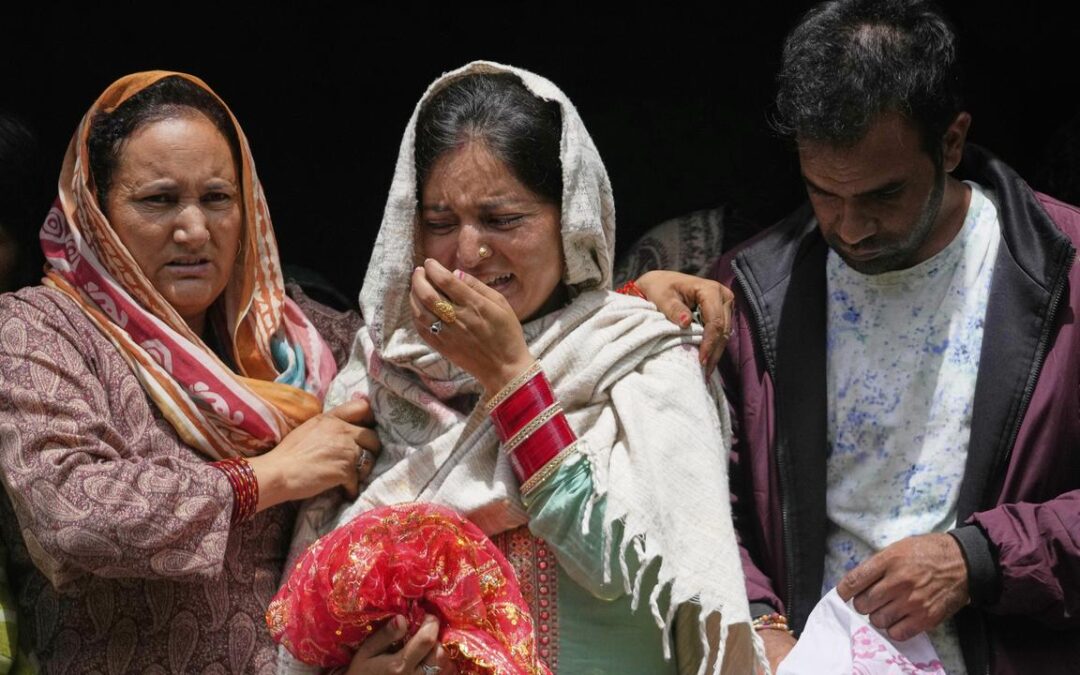
Flash floods kill more than 200 in India and Pakistan
Flash floods have killed more than 200 people and left scores of others missing in India and Pakistan, as rescuers brought to safety some 1600 people from two mountainous districts in the neighbouring countries.
In Pakistan, a helicopter carrying relief supplies to the flood-hit northwestern Bajaur crashed on Friday due to bad weather, killing all five people on board, including two pilots, a government statement said.
Sudden, intense downpours over small areas known as cloudbursts are increasingly common in India’s Himalayan regions and Pakistan’s northern areas, which are prone to flash floods and landslides.
Cloudbursts have the potential to wreak havoc by causing intense flooding and landslides, impacting thousands of people in the mountainous regions.
Experts say cloudbursts have increased in recent years partly because of climate change, while damage from the storms also has increased because of unplanned development in mountain regions.
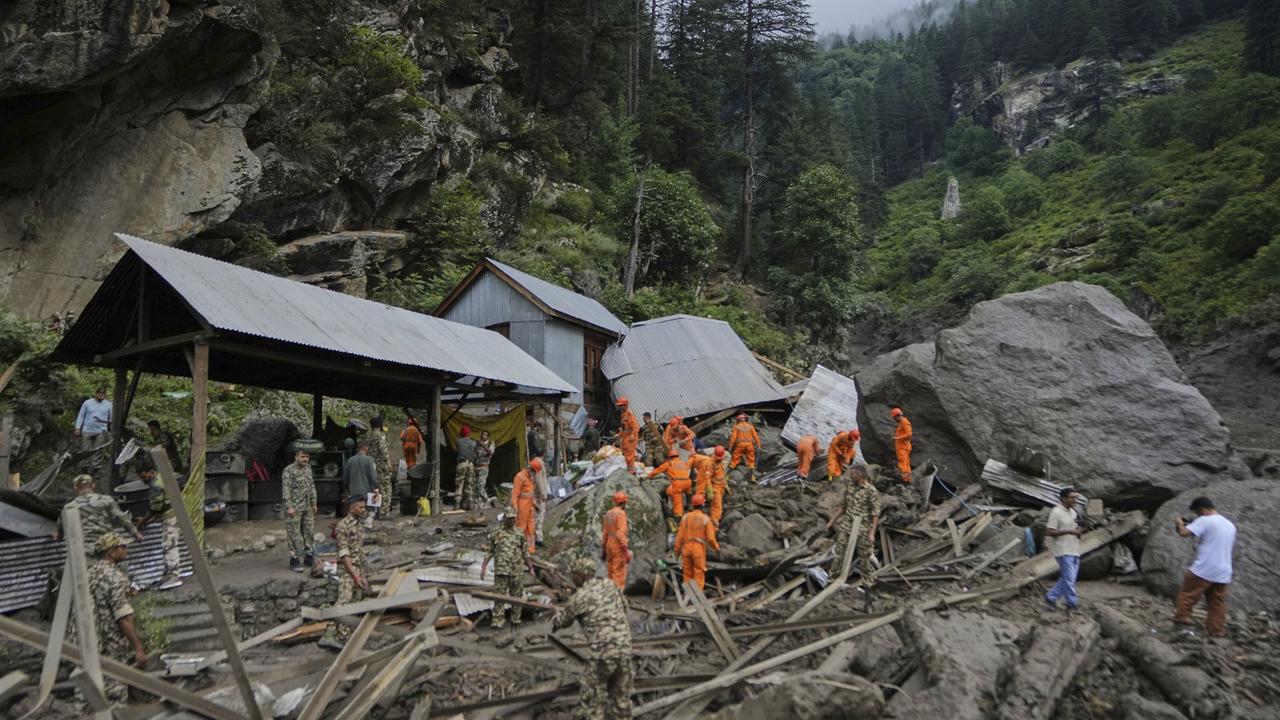
In India-controlled Kashmir, rescuers searched for missing people in the remote Himalayan village of Chositi on Friday after flash floods a day earlier left at least 60 people dead and at least 80 missing, officials said.
Officials halted rescue operations overnight but rescued at least 300 people on Thursday after a powerful cloudburst triggered floods and landslides.
Officials said many missing people were believed to have been washed away.
Harvinder Singh, a local resident, joined the rescue efforts immediately after the disaster and helped retrieve 33 bodies from under mud, he said.
At least 50 seriously injured people were treated in local hospitals, many of them rescued from a stream filled with mud and debris.
Disaster management official Mohammed Irshad said the number of missing people could increase.
Weather officials forecast more heavy rains and floods in the area.
Chositi, in Kashmir’s Kishtwar district, is the last village accessible to motor vehicles on the route of an ongoing annual Hindu pilgrimage to a mountainous shrine at an altitude of 3,000 metres.
Officials said the pilgrimage, which began July 25 and was scheduled to end on September 5, was suspended.
The devastating floods swept away the main community kitchen set up for the pilgrims, as well as dozens of vehicles and motorbikes.
More than 200 pilgrims were in the kitchen at the time of the flood, which also damaged or washed away many of the homes clustered together in the foothills, officials said.
Sneha, who gave only one name, said her husband and a daughter were swept away as floodwater gushed down the mountain.
The two were having meals at the community kitchen while she and her son were nearby.
The family had come for a pilgrimage, she said.
Photos and videos on social media show extensive damage with household goods strewn next to damaged vehicles and homes in the village.
Authorities made makeshift bridges Friday to help stranded pilgrims cross a muddy water channel and used dozens of earthmovers to shift boulders, uprooted trees and electricity poles and other debris.
Kishtwar district is home to multiple hydro-electric power projects, which experts have long warned pose a threat to the region’s fragile ecosystem.
In northern and northwestern Pakistan, flash floods killed at least 164 people in the past 24 hours, including 78 people who died in the flood-hit Buner district in northwest Pakistan on Friday.
Dozens were injured as the deluge destroyed homes in villages in Buner, where authorities declared a state of emergency on Friday.
Ambulances have transported 56 bodies to local hospitals, according to a government statement.
The helicopter that crashed on Friday was on a relief mission when it went down in the northwest provincial chief minister Ali Amin Gandapur, said.
Rescuers evacuated 1300 stranded tourists from the mountainous Mansehra district hit by landslides on Thursday.
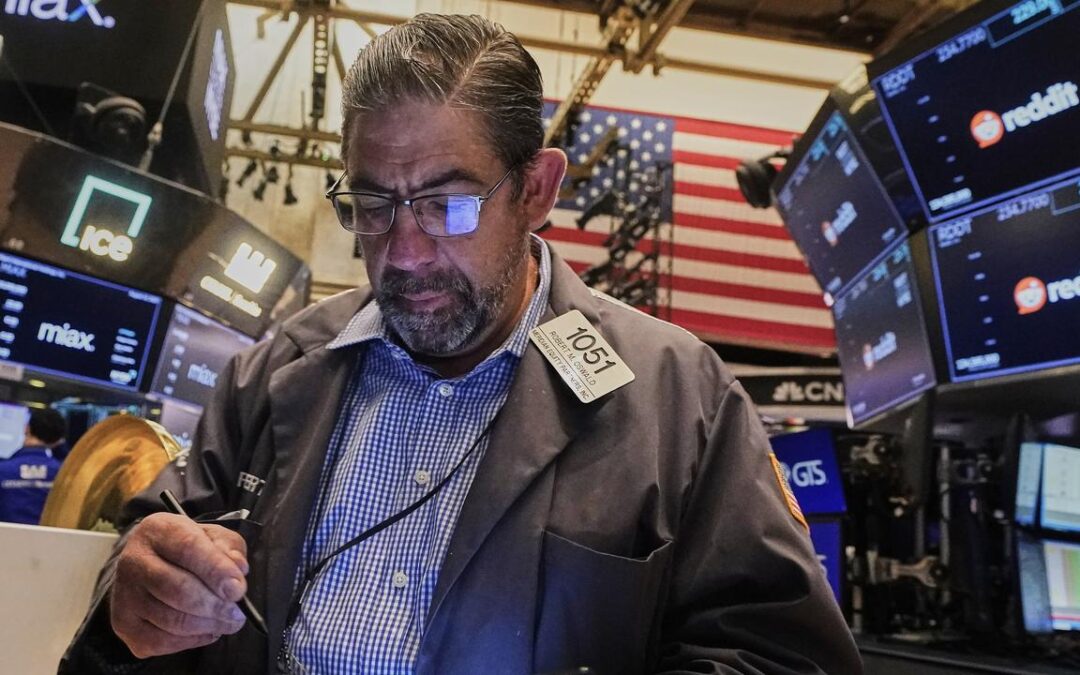
Stocks near record as markets await Trump-Putin talks
Global stocks have traded near record highs as investors await key talks between Donald Trump and Vladimir Putin over Ukraine in Alaska and for US retail data that might give clues on the health of the world’s biggest economy.
The MSCI All Country World Index consolidated recent gains on Friday as European stocks edged higher in early trading.
The index was last up 0.2 per cent at 953.4, just shy of the record level of 954.21 set on Wednesday.
Wall Street futures were also up slightly about 0.1 per cent to 0.2 per cent.
The White House has said the Trump-Putin meeting would take place at 11am, Alaska time, on Friday (5am on Saturday AEST), with the US president’s hopes of a ceasefire agreement on Ukraine uncertain.
Trump has said a second summit involving Ukrainian President Volodymyr Zelenskiy could follow if the talks go well.
“There’s still a small degree of risk premium in European markets because of the war. Any type of resolution will ultimately pare that back,” said Shaniel Ramjee, co-head of multi-asset at Pictet Asset Management, adding that oil and other commodity prices could also react.
“But I think that the market has learnt not to expect too much from these negotiations. Ultimately, Zelenskiy and the Europeans are not invited. They will need to be involved in any final negotiation.”
Investors are also training their sights on US retail data due later on Friday after an unexpected spike in producer price data on Thursday renewed inflation concerns and pared market expectations for Federal Reserve rate cuts in 2025.
“What it did was to get rid of all the chat about a 50 basis point cut (in September),” said Mike Houlahan, director at Electus Financial Ltd in Auckland.
The 10-year US Treasury yield was flat at 4.287 per cent after the previous day’s 5 basis point rise in the aftermath of the PPI data.
The dollar index, which tracks the greenback against a basket of six major currencies, was last trading down 0.2 per cent at 97.965.
Japanese GDP data released on Friday showed the economy expanding by an annualised 1.0 per cent in the April-June quarter, beating analyst estimates.
The dollar weakened 0.4 per cent against the yen to 147.16.
In commodities markets, Brent crude was down 0.7 per cent at $US63.52 per barrel.
Gold edged up 0.2 per cent to $US3,342 per ounce.
Cryptocurrency markets stabilised after bitcoin touched a record $US124,480.82 on Thursday.
The digital currency was last up 0.9 per cent.
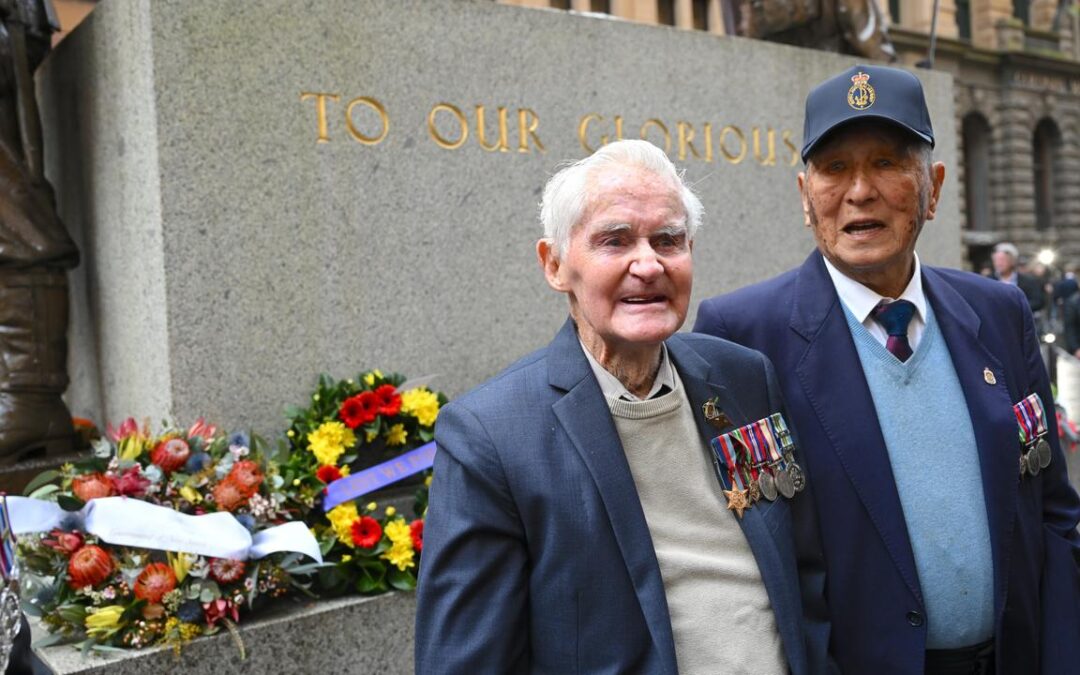
Lessons ‘not learnt’ 80 years on from World War II
Memories of those who have served and those who fell before the end of the Second World War have been carried forward, 80 years on.
Services across the nation marked the Victory in the Pacific anniversary on Friday, with commemorations held at the Sydney Cenotaph, the National War Memorial in Canberra, the Shrine of Remembrance in Melbourne, the State War Memorial in Perth and the National War Memorial in Adelaide.
Braving frosty conditions, Maureen Bell, from Brighton in Melbourne’s southeast, commemorated her father Bert Jones’ memory, proudly wearing his war medals at the Shrine.
She remembered her dad as one of many who never talked seriously about the war, instead telling funny stories of his service to ease the memory of terrible times.
“He said he was called Screamer because they would play AFL football in New Guinea and he’d jump up and take a mark and everybody would say that was a screamer of a mark,” she reminisced.
“But I found out decades later that dad was called Screamer because he was really loud.”
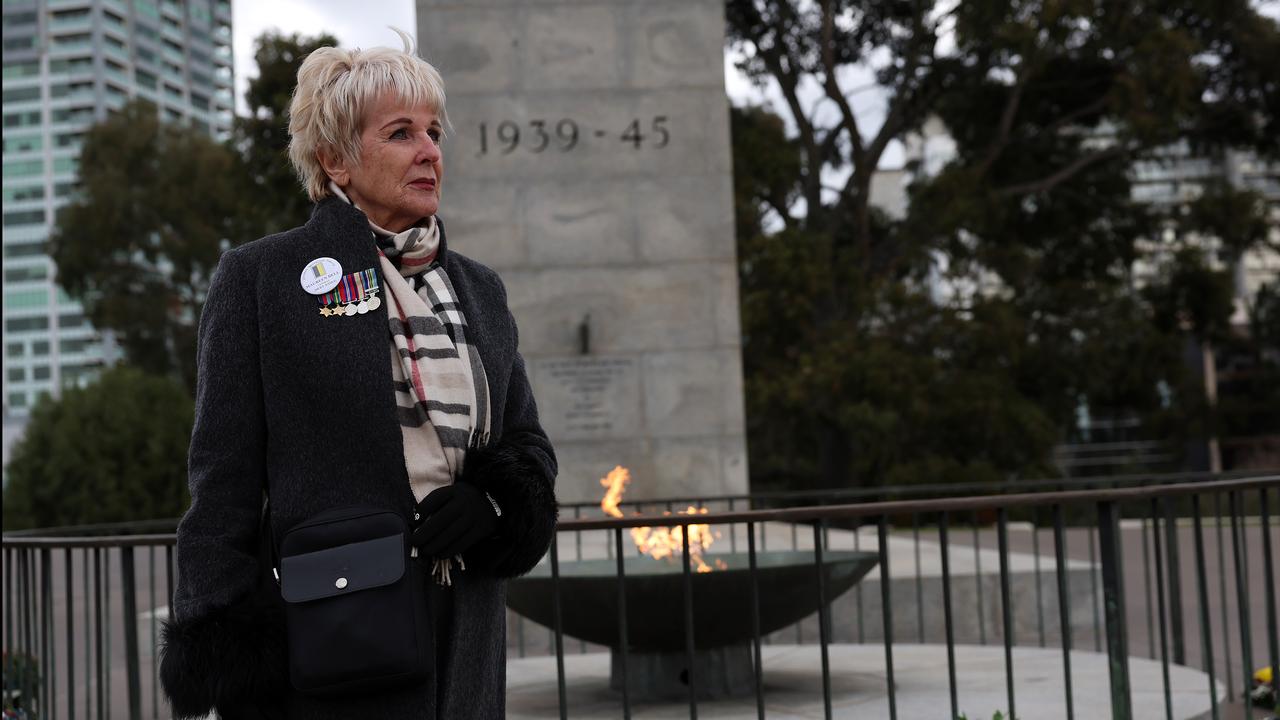
Ms Bell said she was proud of her dad’s legacy, but lamented the human race hasn’t learnt from past mistakes.
“It’s important to honour those that have gone before us and made incredible sacrifices, endured horrendous torture and sadness, but we don’t seem to learn from it,” she told AAP.
“We keep doing it unfortunately.”
Phil Ward attended the Sydney service to honour his father’s legacy in the 2/20th battalion in Singapore, having survived internment and the Burma railway.
The commemorations represented the “enduring gratitude” to those who defend our freedoms, Mr Ward said.
Prime Minister Anthony Albanese marked VP Day, when Japan accepted the Allied forces’ terms of surrender sparking the end of World War II, by paying tribute to soldiers’ courage and the stories of endless longing for the home many never saw again.
Almost one million Australians served in uniform during the war, but 40,000 never got to see its conclusion.
About 66,000 were wounded, while many thousands more became prisoners of war, with 8000 dying in captivity.
“Every life and dream and future swallowed in that vortex of madness and cruelty, from every battlefield and every burning city, from the prisoner of war camps to the unprecedented horror of the concentration camps,” Mr Albanese said.
“These were nightmares made real – not by monsters but by human beings in a grotesque perversion of humanity.”
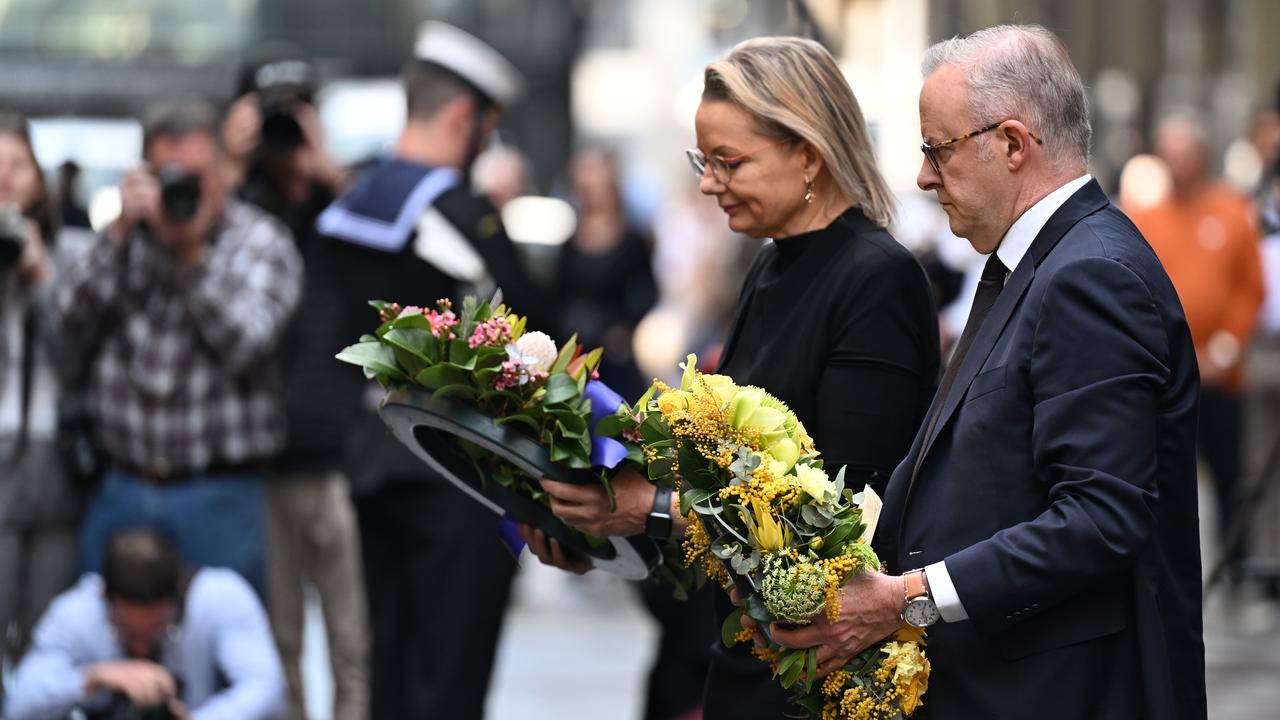
Despite the jubilation that came from the victory, there was also sorrow for those who perished.
RSL Victoria President Mark Schroffel said there were countless unsung heroes who never returned home to tell their stories or had the chance to have a family.
“That’s particularly sad for them, and hopefully what we’re doing today will help preserve their memory,” he said.
“The sacrifice and the loss was a terrible time for the world and we need to remember that even though a victory was declared, nobody really wins.”
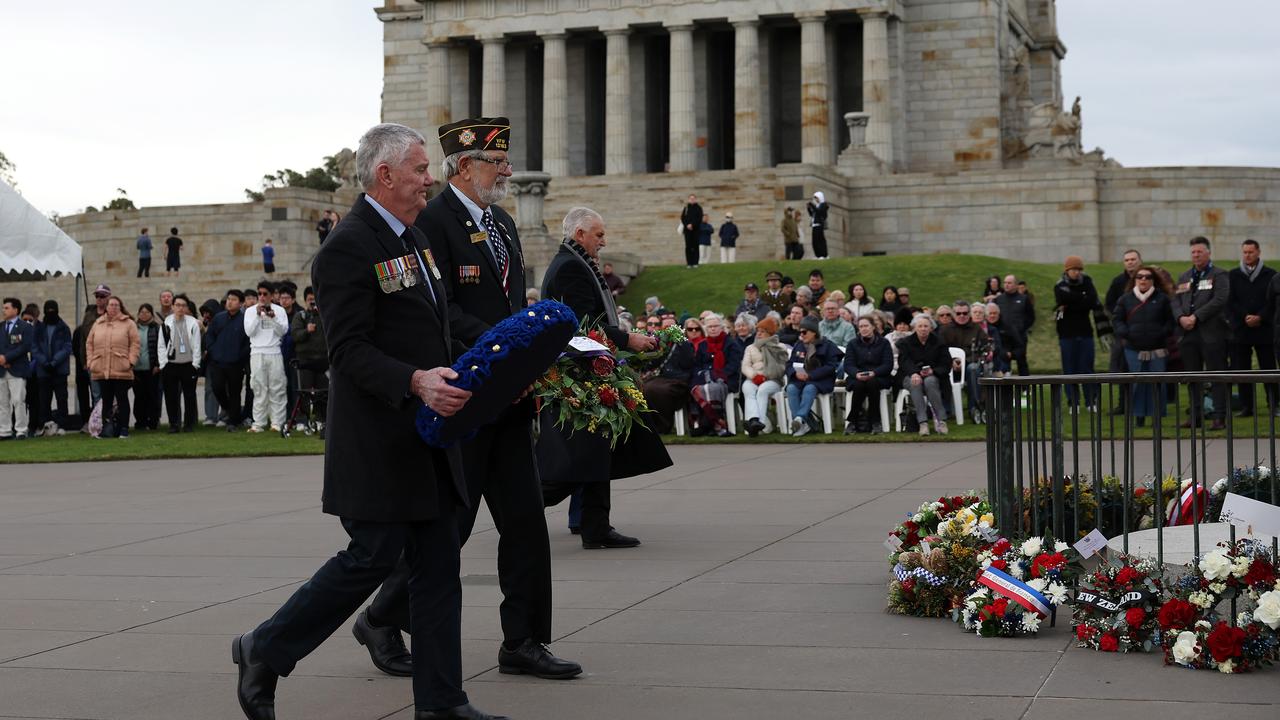
Australia played a significant role in the Pacific during World War II, fighting against Japan from 1941 to 1945.
Initially, Australian forces engaged in campaigns in Malaya and Singapore.
After the bombing of Darwin in February 1942, the focus shifted to defending the Australian mainland and supporting the US-led counteroffensive in the Pacific.
Federal Veterans’ Affairs Minister Matt Keogh said the day marked the end of a great darkness – brought on by the most devastating global conflict in human history.
Lifeline 13 11 14
Open Arms 1800 011 046